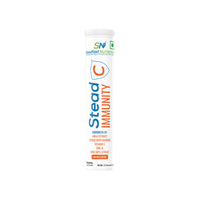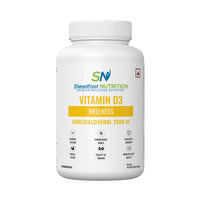Table of Content
Maintaining good health requires daily nutrients, as better nutrition is linked to increased longevity, higher energy levels, and overall well-being. For seniors, achieving this can be challenging due to common issues like loss of appetite or consuming smaller meals as age increases. Along with a healthy diet supplements can bridge this gap, providing essential vitamins quickly and conveniently.
As our bodies change with age, so do our nutritional needs. Seniors are particularly susceptible to nutritional deficiencies and may require additional support for bone, brain, heart, eye, prostate, and digestive health.
As you age, nutrient absorption can decline due to age or medications. Various vitamins can help by providing additional nutrients and boosting energy.
Why are vitamins important for seniors?
Vitamins are crucial for seniors due to several age-related challenges. Nutrition and exercise are ideal for maintaining health, but not all seniors can meet their nutritional needs through food alone.
Vitamins are important for seniors because:
1. Nutrient Absorption Declines:
As people age, their bodies become less efficient at absorbing nutrients from food. Adding vitamins to the diet can help overcome deficiencies.
2. Appetite Loss:
Seniors often experience decreased appetite and taste changes, leading to insufficient food intake. For instance, low levels of vitamin B1 (thiamine) may cause a loss of appetite.
3. Bone Health:
Aging bones become more brittle, increasing the need for vitamins that support bone health, such as vitamin D.
4. Disease and Medication:
Certain diseases and medications can impair the body's ability to absorb or retain essential nutrients. Vitamins help in fighting infection, wound healing, and reducing the side effects of medications.
5. Convenience Foods:
Older adults may rely more on ready-to-eat meals, which often lack essential vitamins and minerals.
While it’s best to get nutrients from a balanced diet, supplements can help fill gaps. However, seniors should consult with healthcare providers to avoid potential side effects and interactions with medications.
Top 10 Vitamins For Seniors
1. Vitamin C
High-dose vitamin C supplements are popular for warding off colds, but a diet rich in fruits and vegetables can provide sufficient amounts. Vitamin C is a powerful antioxidant that supports the immune system and aids healing. Since the body doesn't produce it, regular intake from dietary sources or supplements is necessary. It may help reduce symptoms like easy bleeding, skin bruising and joint pain. Experts recommend consuming five to six portions of fruits and vegetables daily, with only one being fresh fruit juice in case of trouble chewing. Good sources of vitamin C include citrus fruits, strawberries, mango, bell peppers, tomatoes, broccoli, spinach, cabbage, and cauliflower.
Try SteadC - vitamin C in effervescent form for the best absorption of nutrients. Being in effervescent form, it is easy to consume with more bioavailability than regular vitamin C supplements. Besides Vitamin C, SteadC provides zinc, citrus bioflavonoid, and rosehip extract which have powerful antioxidant and anti-inflammatory effects and work in synergy to strengthen immunity and skin health. The effervescent form is an added advantage since it ensures the best absorption of these nutrients and makes SteadC extremely easy to consume, including for those who find it difficult to take tablets.
2. Vitamin B6
Vitamin B6 is a water-soluble vitamin, present in many foods and is also available as a supplement. It is involved in the metabolism of protein, amino acids, carbohydrates, and lipids.
Vitamin B6 also supports cognitive development, neurotransmitter biosynthesis, homocysteine regulation, gluconeogenesis, glycogenolysis, immune function, and haemoglobin formation. It is especially important for older adults to consume vitamin B6, as lower levels can cause anaemia, mouth cracks, tongue soreness, depression, poor immunity and skin inflammation.
Adults aged 60 and older have higher vitamin B6 requirements. The recommended dietary allowance (RDA) for vitamin B6 is 1.9 mg for both men and women.
3. Vitamin B12
Vitamin B12, stored in the liver, is crucial for cognitive functioning and red blood cell production. Impaired absorption of vitamin B12 due to decreased acid secretion, gastric surgeries and autoimmune diseases like celiac disease and Crohn’s disease may lead to a deficiency of vitamin B12. Seniors are at higher risk for B12 deficiency, which can lead to megaloblastic anaemia, depression, formation of weaker red blood cells, impaired nerve functioning, and cognitive decline leading to dementia, Parkinson’s, and Alzheimer’s disease. It’s recommended that adults, especially those over 60, get tested for B12 deficiency and aim for 2.5 micrograms daily from sources like animal products, fortified grains, nuts, and seeds. Supplements are often necessary, particularly for those on vegetarian diets.
4. Biotin
Biotin, necessary for the breakdown of fats, carbohydrates, and proteins is found in foods like organ meats, eggs, salmon, legumes, avocado, and sunflower seeds. Deficiency is rare but can cause hair thinning, rashes, scaly skin, brittle nails, mild depression, insomnia, and fatigue.
5. Vitamin B9
Folate (Vitamin B9) is essential for energy production, DNA replication, amino acid metabolism, and proper cell division. The synthetic form, folic acid, is found in fortified foods and supplements. The recommendation for men and women is 300 mcg and 220 mcg respectively. Folate-rich foods include dark green leafy vegetables, beef, liver, avocado, papaya, orange juice, eggs, beans, and nuts. Fortified grain products like breads and cereals also contain folic acid. Folate deficiency is rare due to fortification, but symptoms can include weakness, headache, loss of appetite, shortness of breath, and sores on the tongue or in the mouth. Those who consume excessive alcohol, have celiac disease, malabsorption syndrome, or Inflammatory Bowel Disease may need extra folate. It is important not to exceed 1,000 mcg of folic acid daily to avoid masking a vitamin B12 deficiency, which can cause permanent nerve damage.
6. Vitamin B3
Vitamin B3, or niacin, is crucial for cellular signalling, metabolism, and DNA repair. It's found in foods like red meat, fish, and legumes, nuts, seeds and fortified cereal. The body converts niacin into a coenzyme called NAD, essential for over 400 enzyme reactions. Deficiency can lead to pellagra, characterised by scaly skin, digestive issues, and neurological problems. Elderly individuals are at a higher risk due to slow metabolism and reduced nutrient absorption. Niacin's benefits include helping lower cholesterol levels as well as lowering high blood pressure and potentially mitigating neurodegenerative diseases. It also eases arthritis symptoms.
7. Vitamin A
Vitamin A is crucial for seniors as it enhances immune function and supports vision health, which naturally declines with age. Food sources rich in vitamin A include broccoli, egg yolk, sweet potatoes, pumpkin, leafy greens, tomatoes, mangoes, fatty fish, carrots, and liver. Men over 60 should aim for 1000 mcg of vitamin A daily, while women should aim for 840 mcg. Vitamin A supplements are recommended for those at risk of deficiency or with specific health conditions that warrant supplementation.
8. Vitamin D
Vitamin D is crucial for seniors as it aids in calcium absorption, promoting bone health and reducing the risk of osteoporosis. It also supports the immune system and may protect against respiratory infections. Other than sunlight exposure, sources include fatty fish, red meat, egg yolks, fortified cereals, and milk. Adults aged 51 to 70 should aim for 600 IU daily. Supplements are recommended for older adults, especially if sunlight exposure is limited. Consulting a healthcare professional is advised to manage potential interactions with medications and ensure safe supplementation.
The elderly are more susceptible to deficiency due to the increased requirement of vitamin D in old age and decreased conversion. Insufficient vitamin D3 levels increase the risk of bone pain, osteoporosis, osteomalacia, secondary hyperparathyroidism, and weakened immunity. As a remedy, seniors are advised to take capsules of Steadfast Nutrition’s Vitamin D3 Capsules daily to maintain adequate levels.
9. Vitamin E
Vitamin E is important for seniors due to its antioxidant properties. It may also slow cognitive decline. Supplementation with Vitamin E may be effective in reducing muscle damage, thalassemia, and sepsis, delaying Alzheimer’s disease, and maintaining the health of blood cells, eyes, and skin.
Good dietary sources include sunflower seeds, peanuts, spinach, red bell pepper, kiwi, almonds, avocados, and olive oil. A daily intake of approximately 7.5 to 10 mg alpha-tocopherol (a form of vitamin E) is recommended, achievable through food sources or supplements.
10. Vitamin K
Vitamin K is essential for seniors, supporting blood clotting, bone health, cellular processes, and immune function through its anti-inflammatory properties, combating age-related diseases. Sources include leafy vegetables like kale, mustard green, lettuce and spinach. Deficiency symptoms include vomiting, seizures, skin bruises, pale skin, and nose bleeds with extreme symptoms leading to delayed blood clotting, bleeding, haemorrhaging and Malena. Vitamin K recommendation is 55 mcg to fulfil the requirement.
Conclusion
Vitamins are essential for general wellness functions like supporting low energy, strengthening weak immunity, managing blood pressure, ageing skin, and supporting eye, heart, brain, joint and bone health. A diverse diet typically provides all adequate vitamins needed, but during ageing, deficiencies can be treated or prevented through dietary supplements. These supplements are available in stores and online, offering a safe option when used as directed. High doses, however, should be taken only under medical supervision.




